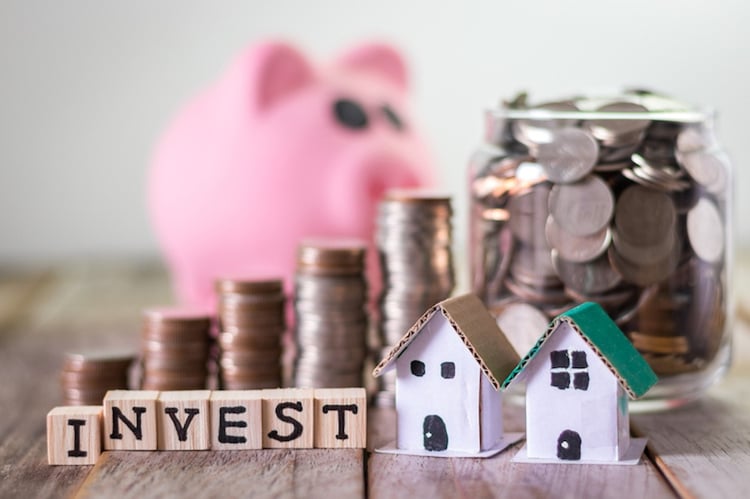Wondering what to do with $75k is a nice situation to be in, especially with all of the investment options that are available today. While some investors focus strictly on protecting their principal, others may want to put their capital to work to generate a recurring stream of income.
In this article, we’ll take a look at 7 ways to invest $75k, including some important things to do first.
Key takeaways
- Before investing any amount of money, investors may wish to get their financial house in order by paying off high-interest debt, fully funding a retirement account, and setting aside money for a rainy day.
- Three main factors to consider when investing $75k are risk, timing, and financial goals for investing.
- Some of the 7 ways to invest $75k include buying traditional stocks and bonds, doing peer-to-peer lending, and investing in real estate.
What to consider before investing
There are a few things for an investor to do before investing $75k. First, make sure their “financial house” is in order. Then, consider factors that may dictate where and what to invest all of that money in.
The first thing to do before investing $75k is to pay off high-interest debt.
According to Experian, the average consumer has outstanding debt of more than $80,000 from credit card, auto, personal, and student loans. Low-interest debt such as a mortgage loan isn’t necessarily bad. But with the average APR on credit cards as high as 22.87%, it can make good financial sense to pay these off first.
Secondly, people may wish to make sure that retirement plan contributions are maxed out. Contributions to retirement accounts like an employer retirement plan, 401(k), traditional IRA, and SEP IRA are not taxed. Taxes are only paid when money is withdrawn, and in retirement people are generally in a lower tax bracket.
Many people also decide to create an emergency fund before investing. By setting aside money for unexpected car repairs, medical bills, or a job loss, it may be much easier to weather a financial storm. The amount of money in an emergency fund varies based on an individual’s risk tolerance. As a rule of thumb, people will hold 3- to 6-months worth of living expenses in an emergency fund.
After putting their financial house in order, there are several factors people consider before investing their $75,000:
- Risk: As a rule of thumb, the higher a potential return is the higher the risk is, everything else being equal. Some investors are comfortable taking a high level of risk in an attempt to maximize returns, knowing that much of their capital could be lost if things don’t go according to plan. Other people look for a balanced blend of risk and reward, such as owning blue-chip stocks or buying-and-holding real estate.
- Timing: Another factor to consider when investing $75k is the investment time horizon. People who may need the money on short notice should avoid investing in assets that periodically fluctuate in price. On the other hand, investors with a long-term time horizon of several years or more may be less prone to cashing out if the market enters a normal downward cycle.
- Goals: Understanding why an investment is being made can be just as important as understanding when and what to invest in. In real estate, for example, some investors aim to generate short-term profits by fixing and flipping homes, while others invest in rental property over the long term with the goal of having sufficient income and assets when the time comes to retire.

7 ways to invest $75k
There are a number of ways to invest across the entire risk and reward spectrum.
Stocks
Over the past 10 years, the S&P 500 has increased by about 450%. If an investor had purchased $75k in stocks back in 2010, the portfolio would now be worth $337,500. However, one of the problems with the stock market is picking the right stocks to own and resisting the urge to sell. While we all hear about people who became millionaires by investing in Google or Facebook stock, we usually don’t hear about people who lost their life savings by investing in the worst stocks of the 11-year bull market.
An alternative to investing in individual stocks is to buy ETFs and mutual funds. ETFs and mutual funds are basically baskets of stocks, pre-bundled for you, so you can make a single investment and get instant diversification.
Bonds
Bonds can be a good way for people who are risk-averse to invest $75k. Cities, municipalities, and the U.S. Government sell bonds to pay for infrastructure projects like water treatment plants and parks, and to fund operations.
The principal invested in bonds is generally safe and secure, such as Treasury bonds backed by the full faith and credit of the U.S. Government. However, there isn’t the opportunity for breathtaking gains. For example, recent T-bond auctions on TreasuryDirect offered an interest rate of 0.875% on a 5-year note.
Crypto
Bitcoin has been on a tear in the second half of 2021, with the price of a single coin increasing by more than 500% over the past year. Well-known public companies like MicroStrategy, Square, and Tesla all are buying bitcoin as part of their corporate treasuries.
But while bitcoin has posted some pretty impressive gains as of late, investing the entire $75k in crypto isn’t for the faint of heart. Earlier in 2021, bitcoin reached what was then an all-time high, only to lose more than 50% of its value over the following three months. And other crypto currencies have not fared as well.
Real estate
While all assets fluctuate in value at one point or another, single-family rental (SFR) homes are recognized as an attractive investment alternative, but with less volatility than stocks, bonds, and crypto. In fact, SFRs have historically offered more attractive risk-adjusted returns than the S&P 500 and bonds.
According to CoreLogic, single-family rent prices in many markets have been seeing double-digit rent growth lately, significantly outpacing the reported rate of inflation. However, one of the challenges to buying real estate is that in many places housing prices are sky-high. That’s one reason why out-of-state real estate investing is becoming so popular.
The Roofstock Marketplace has hundreds of single-family rentals and small multifamily properties listed for sale in more than two dozen states, some with asking prices of $100,000 or less. With Roofstock, it’s totally possible to use $75k to pay cash for a rental home, or buy 2 by using the $75k as a down payment.
REITs
Real estate investment trusts (REITs) are an alternative to owning real estate directly. REITs own, operate, and invest in different real estate asset classes across the country, including single-family homes, apartment communities, student housing, and special use commercial real estate like cell site towers and cold storage facilities.
Shares of public REITs can be bought and sold on the major trading platforms, just like any other stock or bond. In addition to being highly liquid, one of the other nice things about owning a REIT is the potential for recurring dividend income.
By law, REITs are required to pay out 90% of their income to shareholders. According to Nareit, the top 21 residential REITs have an average dividend yield of 2.51% and boast a YTD total return of 36.29% (September 2021).
But unlike directly owning a rental property, investors have little control over how properties held by a REIT are managed. Also, REITs don’t offer the same tax benefits that directly owning a rental property does, such as deducting owner expenses and using depreciation expense to reduce personal taxable net income.
Crowdfunding
Real estate crowdfunding platforms like Fundrise and CrowdStreet raise small amounts of money from large numbers of investors. The capital raised is used to buy, develop, and operate major real estate projects like build-to-rate single-family subdivisions, apartment buildings, and shopping centers.
When a project begins to generate income, regular distributions are paid to investors along with a share of the profits when the property is sold. Crowdfund opportunities are available to both accredited and non accredited investors, and account minimums begin at $500 or less.
One of the downsides to investing in a crowdfund is that money is often tied up for 1 year or longer. Trading shares of a crowdfund investment may also be difficult, because there generally isn’t a public secondary market available to trade crowdfund shares, like there is for REITs or single-family rental property.
Lending
Another option for investors seeking to generate yield from $75k is peer-to-peer lending websites like Kiva, Prosper, and Funding Circle. Investors can loan as little as $25 to borrowers who have been vetted by FICO score, debt-to-income ratio, and recent payment history.
Interest rates generally average around 5.5%, or more for higher-risk loans, and Kiva in particular touts a loan repayment rate of 96%. In addition to offering potential recurring monthly returns, lending to individuals and small businesses is also a way to help others and give back to the community.
Final thoughts
There are plenty of good ways to invest $75k in today’s day and age. Investors who are extremely risk averse with a focus on capital preservation may opt to put all of their money in T-bonds, while others who thrive on risk might choose to roll the dice and purchase bitcoin. To take a diversified approach, investors may wish to consider investing in both equities and hard assets like real estate.









